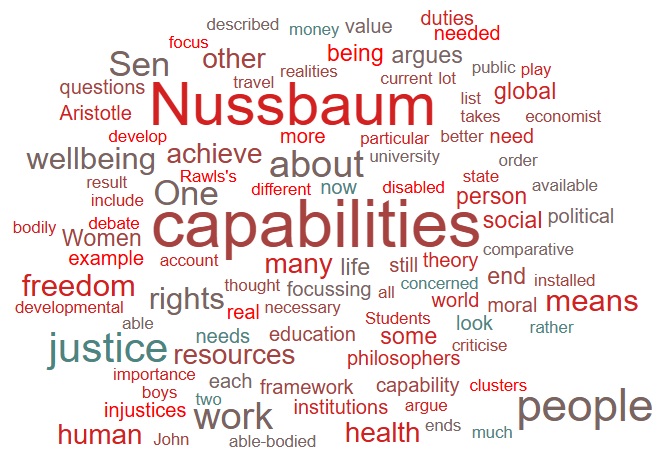Template:Nussbaum-capability
|
The Wells School of Philosophy
Roll Call 29th October 2024, Hare Lane, 1000-1215 hrs: Tutors: Linda (L), Steve (S) Pupils: John (J), Patricia (P), David (D), Margie (M), Alexis (A), Ray (R) Scribe: Gavin (G) Apologies: Viki (V), Howard (H), Colin (C) The homework setOur next meeting is on the work of Martha Nussbaum, in particular the capabilities approach she has developed in conjunction with the Indian philosopher and economist Amartya Sen. If you have begun researching Nussbaum you will have seen that her range of interests and publications is wide. Her books include topics such as justice, ancient Greek ethics, law and feminism. Her work is powerfully intellectual; she has engaged deeply with the views of a wide range of philosophers and has been unafraid to strongly criticise prominent ones such as Derrida and Foucault, not to mention Plato. She contends he is wrong to dismiss the importance of poetry. Nussbaum believes that literature has great value to develop philosophical thought and argues that the importance of emotion has been ignored by many modern philosophers. Nussbaum posits some fascinating and original concepts at work in the human psyche; for instance her arguments about the effect of ‘disgust’ on minority rights. Nussbaum is an advocate of the value of multiculturalism and exploring non-western philosophies, but is not afraid to argue for values and to criticise relativism. We are focussing on the Sen/Nussbaum Capabilities Approach, which is described in this link: https://iep.utm.edu/ge-capab/ The Britannica and Wikipedia entries on Nussbaum are useful. You should also find it helpful background to read about global justice from other sources such as Stanford. We have explored this before with the work of Thomas Pogge—who identifies how the current world order in terms of powerful institutions, economic and political states so benefits rich western/northern countries—a direct result of the colonial past. See also the work of John Rawls on social justice and inequality. In the 1970s Sen, a developmental economist, looked at the realities of freedom and human rights, arguing that it is not sufficient to list rights; it is also necessary to examine the opportunities people have to achieve these and thus achieve wellbeing. For example, you may have the right to vote, but it is of no use if you are unable to travel to the polling station. The capabilities approach is concerned with the wellbeing of people and recognises that resources alone do not guarantee this; external forces also affect wellbeing. Sen argues that what people are able to do with available resources—means—depends on their circumstances. For example there are limitations on opportunities—ends—for people with disabilities, due to restrictions such as lack of access, greater resources needed, and greater expenses incurred, such as special diets and housing. Focussing on ends encompasses the fact that different means may be needed to accomplish the end. So the question is asked: 'What type of means are necessary?' Means could include certain political practises and institutions, or fighting a climate of sexism—not just more money. So we have to look at the capabilities people have to achieve wellbeing if we believe that it is of primary moral significance to work towards a world where freedom of wellbeing is achievable for all. Nussbaum has identified ten capabilities:
She argues that each of these capabilities is needed in order for a human life to be 'not so impoverished that it is not worthy of the dignity of a human being' and defends these capabilities as being the moral entitlements of every human being. Proponents of the capabilities approach contend that it takes a better account of diversity than say Rawls's distributive justice, allowing for those whose lives do not correspond to the able-bodied, non-dependent, care-giving free individual. Sen in Popper fashion argues that rather than a theory of justice describing a Utopian ideal, what we need to look at are injustices to guide us to a less unjust society. However a theory of justice generally specifies not only rights, but also duties. Capability theorists have remained largely silent on the questions of who should bear the duties for the expansion of the selected capabilities. Philosophers such as Onora O’Neill argue that questions of obligations and responsibilities should be central to any account of justice. Nussbaum described the general capability approach as consisting of two clusters, one focussing on comparative quality of life and the other on theorising about justice. The two clusters would share a focus on what people are able to do and to be and would share a commitment to five principles:
Certainly it can be said that this framework has provided a most fruitful springboard for political and social actions. The capability approach contributes to the debate on developmental issues; climate, global and inter-generational justice; children’s rights; animal rights; public health and education. It has been influential in the work of many global organisations such as the WHO. This week's questions for us:
Introduction by L
Discussion
Other Topics Touched On
Podcast Referenced:
|
